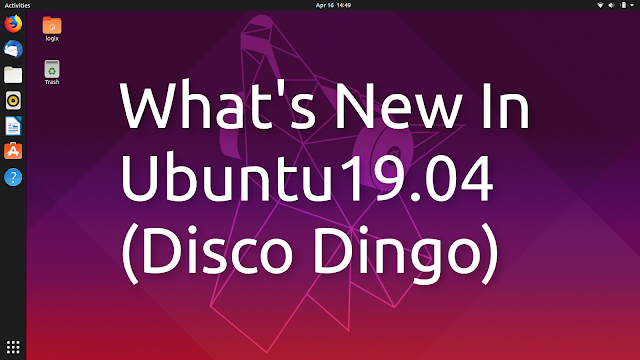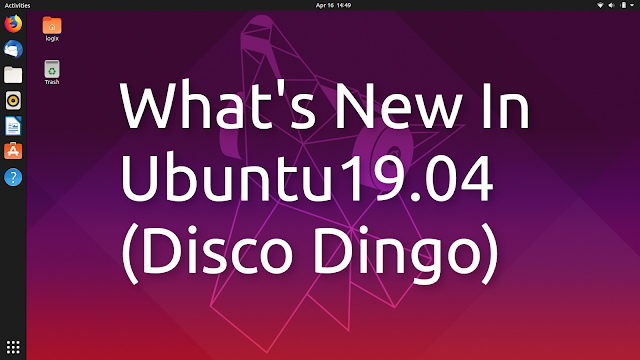Ubuntu 19.04 (Disco Dingo) has been officially released. Read on if you want to see what new features and improvements are included with this new Ubuntu release.
This Ubuntu version is supported until January 2020. For a longer supported release, use Ubuntu 18.04 LTS instead, which is supported until April 2023.
Ubuntu 19.04 uses the latest stable GNOME 3.32
For the 19.04 release, Ubuntu uses the latest stable version of GNOME, 3.32 (with some components updated to 3.32.1). This includes GNOME Shell, Settings, GDM3, as well as the core applications, like Gedit (text editor), Software, GNOME Terminal, and so on.
The GNOME 3.32 release includes quite a list of changes, like:
- Mutter and GNOME Shell should be faster with this release, thanks to several performance improvements to foundation data structures that make animations, icon grid and the top panel faster and snappier. Also, some blocking operations were taken out of the main loop, which should fix random stalls some people were seeing
- The GNOME 3.32 release brings improvements and bug fixes for fractional scaling, although this feature is still considered experimental (requires enabling an option via gsettings). Starting with this GNOME release though, the shell will paint all its elements in a good visual quality at any fractional scaled value, independently for every monitor
- New Applications panel in Settings, which includes some already existing settings, for notifications, sound and search, as well as application permissions, which can be either built-in which can’t be changed, or user-controlled which allow the user to revoke them if the user desires.
- Redesigned GNOME Sound settings – it now uses a vertical layout, with a more intuitive placement of options
- Night Light now supports warmer/cooler color temperature settings
- Google Drive performance has been improved, especially for large collections of files
- GNOME Terminal now uses header bars when running in GNOME or GNOME Classic
- DConf Editor: Editable pathbar, improved bookmarks popover, and the ability to run on really small screens
Some of these changes can be seen below.
GNOME 3.32 includes a large number of changes, which I already presented on Linux Uprising, so I suggest you take a look at the
New Features And Improvements In GNOME 3.32 article for a more complete list of improvements.
| Desktop Icons extension is used by default on Ubuntu 19.04 (Disco Dingo) |
For desktop icons, Ubuntu 19.04 Disco Dingo has dropped its Nautilus patches, and now uses the Desktop Icons extension, which was released alongside GNOME 3.32. This extension restores traditional desktop icons, while providing more functionality than Nautilus for this, including multi-monitor support, and support for Wayland, among regular features like thumbnails, resizable icons, symlinks, keyboard shortcuts, renaming files, and so on.
That also means that GNOME Files (Nautilus) has finally been updated to the latest version (3.32) in Ubuntu 19.04 (Disco Dingo), after being stuck at version 3.26 for the past two Ubuntu releases. Since version 3.26, the Files app has gained support for starring files and folders, moved the search in the header bar, and more.
As for the experimental fractional scaling, these changes were included in GNOME 3.32 for Wayland only, but Ubuntu has implemented this for the Xorg session (which is default) as well. You can see how to enable it here. I don’t own a HiDPI monitor so I can’t comment on how well this feature works.
More improvements in Ubuntu 19.04 (Disco Dingo)
Nvidia proprietary drivers available from the Ubuntu installer
For users with Nvidia GPUs, the Ubuntu 19.04 installer can choose the most suitable driver for your GPU’s generation, and install it. This is done if the user enables the
Install third-party software for graphics and Wi-Fi hardware and additional media formats during the Ubuntu installation process:
According to Jason Evangelho’s
Forbes article, this is supported by all Ubuntu 19.04 Disco Dingo flavors with the exception of Lubuntu.
There’s an known issue that when selecting the 3rd party drivers option during install – there’s a long pause before the installation continues. This has yet to be fixed, but the installation works, you’ll just have to wait a bit.
Tracker is installed by default
Tracker is installed by default with Ubuntu 19.04. Tracker is a filesystem indexer, metadata storage system and search tool, and it’s used by some GNOME features and applications. With Tracker installed, you can use the
Nautilus batch rename feature with metadata tags, you can search for files and folders from the Activities Overview, or search faster using the Files app (which also supports full-text search with Tracker). It wasn’t installed by default until now due to performance concerns, but those issues seem to have been resolved.
Theme updates
The Gtk, GNOME Shell and icon themes have also seen further refinements and updates:
Other changes in Ubuntu 19.04 (Disco Dingo) since Ubuntu 18.10 include:
- A new option is added to the Grub menu which will boot with
NOMODESETon, to help with graphics cards issues, and allow users to boot and install any proprietary drivers that are needed - Right click handling is now “area” by default. This allows both two-finger right clicking and clicking in the bottom right corner of the touchpad
- Preview order of windows in the dock is now static and based on the order in which the windows were added
- Alt+Tab handling now switches windows by default. Switching applications by default can be done with Super+Tab
- A Livepatch tab has been added to Software & Updates, but it’s not functional for Ubuntu 19.04, because Canonical’s Livepatch feature (applies security patches that don’t require a system restart) only supports Ubuntu long term releases. This features was implemented so it can be backported to Ubuntu 18.04 LTS
- Linux 5.0 is used by default, bringing:
- AMD FreeSync support (paired with Mesa 19.0)
- Initial support for the NVIDIA GeForce RTX 2000 “Turing” graphics cards support for Nouveau
- Support for AMD Radeon Picasso and Raven2, and enables non-experimental support for Radeon Vega20
- Swap file support for the Btrfs filesystem
- Initial 802.11ax WiFi support
- Added the official Raspberry Pi touchscreen driver to mainline
- Initial HDMI 2.0 support for the Nouveau driver
- Mesa 19.0.2 with support for AMD FreeSync, AMD Zen thread optimizations, and other improvements
- Xorg server 1.20.4 which, since the 1.20.1 version available in Ubuntu 18.10, has only received bug fixes
- Updated toolchain: glibc 2.29, OpenJDK 11.0.3, boost 1.67.0.1, rustc 1.32.0, GCC 8.3 (optional GCC 9), Python 3.7.3, ruby 2.5.1, php 7.2.15, perl 5.28.1 and golang 1.10.4.
Download Ubuntu 19.04
For those of you that want to upgrade to Ubuntu 18.10, the upgrade procedure is
the same as for upgrading to Ubuntu 18.04. It’s worth noting that
Ubuntu users can now keep PPAs and third party repositories enabled when upgrading to a newer Ubuntu version, like 19.04.


